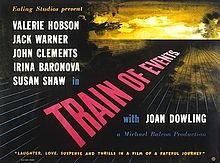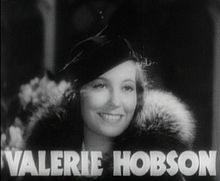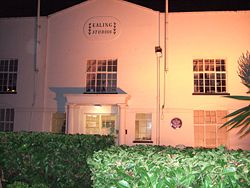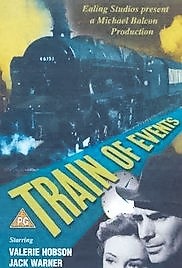Train of Events *** (1949, Valerie Hobson, John Clements, Jack Warner, Gladys Henson, Peter Finch, Irina Baronova, Susan Shaw, Patric Doonan, Joan Dowling, Laurence Payne, Mary Morris, John Gregson, Leslie Phillips) – Classic Movie Review 4,593
Ealing Studios’ 1949 British portmanteau film flashes back to reveal four of the passengers’ stories as a London to Liverpool-bound train heads for a crash into a stalled petrol tanker at a level crossing.
Ealing Studios’ 1949 British portmanteau film Train of Events is a railway version of the bus accident in 1933’s Friday the Thirteenth, in which this time a London to Liverpool-bound train is heading for a crash into a stalled petrol tanker at a level crossing and the film flashes back to reveal four of the passengers’ stories.
It is a fairly good, certainly very interesting, example of the episodic short story portmanteau movie that was oddly popular at the time, and has all but disappeared.
Valerie Hobson and John Clements get top billing as a complaisant wife and her philandering composer-conductor husband in The Composer segment. But more involving are tales with engine driver Jim Hardcastle (Jack Warner), who tries to stop his daughter Doris (Susan Shaw) stepping out with a GI, and another in which an actor called Philip (Peter Finch) bumps off his estranged, unfaithful wife Louise (Mary Morris).
The fourth, less interesting story The Prisoner-of-War is about Ella (Joan Dowling)’s theft in order to run away with her German prisoner-of-war boyfriend Richard (Laurence Payne).
There is plenty of Ealing Studios’ craftsmanship on show and a lot of entertaining acting from a vintage cast. But, on the other hand, there is little of the studio’s usual magic. And the film is let down by slow, stagey handling and a low quota of creepy atmosphere.
The directors are Basil Dearden (The Actor, The Prisoner-of-War), Charles Crichton (The Composer), and Sidney Cole (The Engine Driver).
Train of Events is written by Basil Dearden, T E B Clarke, Ronald Millar and Angus Macphail, runs 90 minutes, is made by Ealing Studios, is released by GFD (UK), is shot by Lionel Banes, Gordon Dines and Paul Beeson, produced by Michael Balcon and Michael Relph, scored by Leslie Bridgewater, and designed by Jim Morahan.
It was released on 18 August 1949 (UK) at the Gaumont Haymarket in London.
As Charmian in the segment The Composer, it is the first film of Leicester-born Gwen Cherrell (born on 12 March 1926), who made only half a dozen movies but was a TV regular till 1984. She died on 24 April 2019 in Grayshott, Hampshire, England.
Also in that vintage cast are Irina Baronova, Patric Doonan, John Gregson, Leslie Phillips, Laurence Naismith, Michael Hordern, Lyndon Brook, Wylie Watson, Mark Dignam, Jacqueline Byrne, Brian Coleman, Philip Dale, Thelma Grigg, Arthur Hambling, Olga Lindo, Miles Malleson, Percy Walsh, Denis Webb and Doris Yorke.
Seeking to learn how a steam engine was driven, Warner fell into a locomotive turntable pit and injured his back, resulting in a permanent limp.
The number of the locomotive is painted out presumably to avoid worrying real-life passengers but is still visible as the numbers are made from raised metal.
The Engine Driver directed by Sidney Cole features Jack Warner as Jim Hardcastle, Gladys Henson as Mrs Hardcastle, Susan Shaw as Doris Hardcastle, Patric Doonan as Ron Stacey, Miles Malleson as Timekeeper, Philip Dale as Hardcastle’s fireman and Leslie Phillips as Stacey’s Fireman.
The Prisoner-of-War directed by Basil Dearden features Joan Dowling as Ella, Laurence Payne as Richard and Olga Lindo as Mrs Bailey.
The Composer directed by Charles Crichton features Valerie Hobson as Stella, John Clements as Raymond Hillary, Irina Baronova as Irina, John Gregson as Malcolm, Gwen Cherrell as Charmian, and Jacqueline Byrne as TV Announcer.
The Actor directed by Basil Dearden features Peter Finch as Philip, Mary Morris as Louise, Laurence Naismith as Joe Hunt, Doris Yorke as Mrs Hunt, Michael Hordern as Plainclothesman, Charles Morgan as Plainclothesman, Guy Verney as Producer, Mark Dignam as Bolingbroke, Philip Ashley as Actor, Bryan Coleman as Actor, Henry Hewitt as Actor, and Lyndon Brook as Actor.
© Derek Winnert 2016 Classic Movie Review 4,593
Check out more reviews on http://derekwinnert.com





